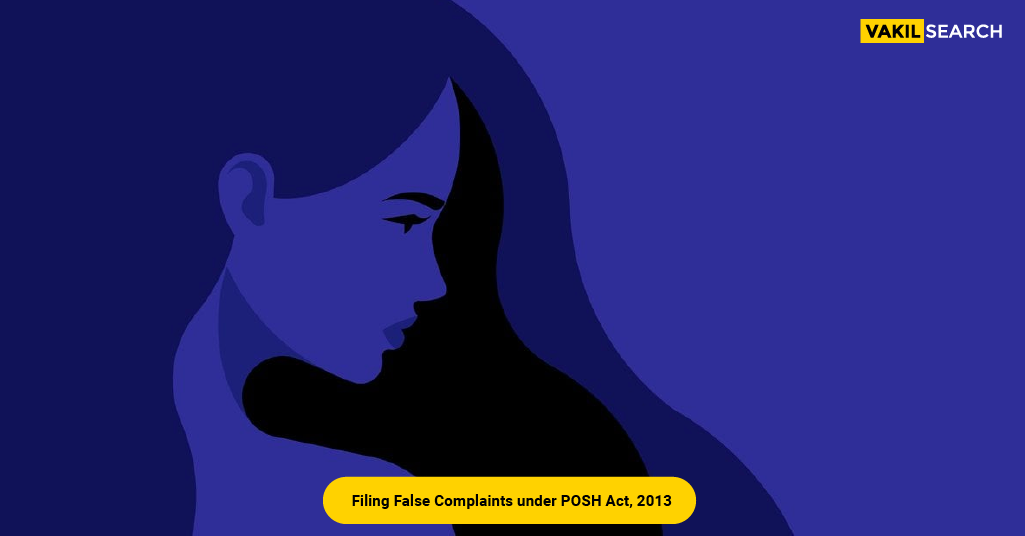Know about what constitutes false complaints under the POSH Act and what the penalties are for making a false complaint at Vakilsearch.
What are False Complaints?
A false complaint is one that was made with the intention of defaming the accused, intentionally presenting false information or proof, or both. A false complaint not only defeats the intent of the POSH Act, but it also harms the accused severely, leading to loss of reputation, emotional pain, and career disruption. There should be serious action taken against the false complaints. It is fundamental to realize that false complaints can happen in any business, and it is as important to take the necessary precautions to avoid them before filing False Complaints Under Posh Act 2013.
Who Gets Punished?
- According to the POSH Act, anyone who files a false charge of sexual harassment, knowing that it is false, or presents fake proof, intending to hurt the accuser, will be given severe punishments.
- Fake complaints always bring disgrace to the organisation or specific individuals. These fake complainants risk not only being prosecuted in court but also being disciplined by the organisation.
- It is important to remember that if the ICC determines that the complaint was submitted with fraudulent intent, the complainant could still be punished even if the accused is found not guilty or acquitted.
How Can ICC Decide Whether a Complaint is False or Not?
- The ICC (Internal Complaints Committee) is the responsible body which is in charge of looking into sexual harassment claims and judging whether they are true or not.
- To ascertain the legitimacy of the complaint, the ICC must adhere to due process and carry out a comprehensive investigation.
- The accused should be given a fair and reasonable opportunity to state their case and submit evidence to support their innocence, according to the ICC.
What Are the Penalties of False Complaints Under Posh Act 2013?
- False reports of sexual harassment are subject to harsh penalties under the False Complaints Under Posh compliance Act 2013.
- A false complaint may face legal repercussions, including up to two years in prison or a fine of ₹1 lakh, or both.
The organization might punish the complainant, and they could lose their job.
How Can an Organisation Prevent False Complaints Under Posh Act 2013?
Organisations can take several measures to prevent false complaints of sexual harassment. These include:
- Train employees regularly on POSH compliance and its consequences for making false complaints.
- Encouraging employees to report incidents of sexual harassment promptly.
- Forming an ICC that is fair, unbiased, and provides a safe environment for complainants.
- Providing support and assistance to the accused during the investigation process.
- We will create firm rules to investigate all complaints fairly and completely.
When is a Complaint Categorized as False?
If someone makes a complaint with a wrong purpose or false information to harm someone’s reputation, it could be considered false. To make sure the accused person is not hurt, the ICC needs to investigate the accusation completely.
What Happens When There’s No Eye-Witness?
No eyewitness doesn’t mean complaint is false. ICC must look at all evidence like complainant’s statement, facts, and other relevant evidence to find truth. ICC should give accused fair chance to prove innocence with evidence.
Conclusion
People and businesses need to know that breaking the Prevention of Sexual Harassment (POSH) Act in India has severe consequences. The accused may damage their career and reputation. To prevent this, businesses must have a strong internal complaints process, and individuals must understand the risks of making false complaints. Vakilsearch can provide legal services for filing POSH complaints and offer compliance advice.
What is the punishment for filing a false complaint under the POSH Act?
If you make a fake complaint under the POSH Act, you might get a warning or lose your job. It depends on how bad the offence is.
How can an organisation prevent false complaints under the POSH Act?
Organisations can stop false complaints by: Telling employees about the bad results of making fake complaints Having a strong way to check complaints Encouraging a trustworthy and clear workplace
What happens if someone is falsely accused under the POSH Act?
If someone is falsely accused under the POSH Act, they have the right to defend themselves and prove their innocence. The Internal Committee will investigate the matter and arrive at a conclusion based on the evidence presented.
Can someone be punished for making a genuine complaint that is not proven?
No, someone cannot be punished for making a genuine complaint that is not proven. The Internal Committee will investigate the matter and arrive at a conclusion based on the evidence presented.
Can an organisation take legal action against someone who files a false complaint?
If someone makes a false complaint under the POSH Act, the organization can sue them. They can also file a defamation suit if the false complaint damages the organization's reputation.

